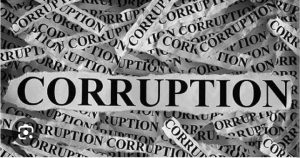By: Bashirat Durojaye
 Any dictionary that defines Nigeria would say a nation where those in the realm of managing the country’s affairs are corrupt and full of selfishness, a nation where more than half of its population lives below the poverty line, where inflation in the price of food items and daily commodity and the only booming business is either politics or kidnapping for ransom and corruption take afront in the public system.
Any dictionary that defines Nigeria would say a nation where those in the realm of managing the country’s affairs are corrupt and full of selfishness, a nation where more than half of its population lives below the poverty line, where inflation in the price of food items and daily commodity and the only booming business is either politics or kidnapping for ransom and corruption take afront in the public system.
Nigeria is bedevilled with problems of good governance which are most hit by the problems of corruption.
The country at the moment is experiencing a slowdown in the petrochemical sector — an area that used to be lucrative. Gas is now a dilemma vulnerable citizens find difficult to cross. Though an injury inflicted on the oil market would navigate a tremendous decline in government revenue and finance, just the same way the oil market boom would boost the country’s economy. Unfortunately, Nigeria which has found its place among the most corrupt countries could not benefit from this. Corruption and greed leave a big topple on public officials.
In recent times, some female ministers of the federation were found laundering public funds for personal luxury because of their incompetence and indulgence screening. Nigeria’s president put no premium on competence and integrity when selecting his ministers. His appointments were mainly based on rewarding personal relationships which opened the door for the prevalence of corrupt ministers.
There are threefold in every ministerial role First, ministers must have the right skills, integrity, competence, and experience; second, ministers must have the right values, and a moral compass, underpinned by a strong public-service ethos; and third, there must be robust institutions, with the rules, norms, and structures, to constrain the behavior of officeholders. Unfortunately, none of these critical elements is evident in the governance of Nigeria which has been the triggering tool for the prevalence of corruption.
Betta Edu, the Minister of Humanitarian Affairs and Poverty Alleviation was alleged to have directed a sum of 585 million naira ($663,000) worth of grants meant for vulnerable groups into a private account in less than six months after her appointment by President Bola Tinubu. She did a tricky job of transferring funds meant for the public to her private accounts claiming it as a mistake.
In Nigeria, the usual riposte is: if any public official has not been convicted by any court, then it’s a free bird. But elsewhere, the standard is different. For instance, if a UK Cabinet Minister, who earns about £148,000 per annum, has assets worth several millions of pounds, which are not inheritance, the British public won’t say he or she has not been convicted by a court; rather, they will say: what are the sources of the wealth? Under the Nolan Principles of Public Life, no one with questionable characters, even without a criminal conviction, will be appointed into a UK cabinet or kept in it, if already appointed.
But that’s not the case in Nigeria where countless people with unexplained and inexplicable wealth are serving ministers and senior public officials.
Though, she received the punishment of suspension with immediate effect following the allegation of embezzlement while Nigeria’s anti-corruption agency carries out a “thorough investigation” of all ministry financial transactions,
The Nigeria we hope for is one where our resources are utilized for the benefit of all and sundry, where people are awarded based on their good works and contributions to public growth, and a country where the government’s main priority is to secure lives and property of the citizens and a country where the rule of law is strictly practiced.
